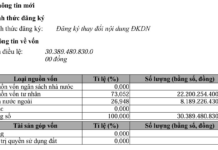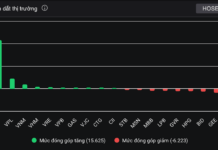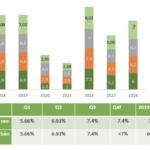
Minister Nguyen Chi Dung: “The current investment environment is ‘very congested’”. Photo: baochinhphu.vn |
Institutions and Business Environment
The first direct impact of institutions on Vietnam today is certainly on the business environment. Despite maintaining a relatively stable macroeconomic foundation and achieving impressive GDP growth, the country’s ranking in global measures of the business environment remains unattractive.
At the beginning of 2024, the European Business Association in Vietnam (EuroCham) published the Business Climate Index (BCI) survey report for Q4 2023. Alongside the usual bright spots, legal quality, administrative regulations, and procedures continued to be a source of concern for businesses. 52% of respondents identified “administrative burden and inefficiency” as one of the top three barriers, highlighting the impact of bureaucracy on business operations. 34% emphasized that “rules and regulations that are unclear and interpreted differently” are also a significant challenge, underlining the need for clarity and consistency in the legal framework.
|
The root of all roots, perhaps, lies in the slowing down of the determination to complete the market economic institution while the core issues of the market economic institution, which are being reformed, are the most “difficult” issues. |
During a questioning session of the National Assembly Standing Committee, Minister of Planning and Investment Nguyen Chi Dung stated that the current investment environment is “very congested”!. “We have been struggling for years, the institutions have improved and innovated a lot to reduce business conditions, but now through the documents of the ministries, branches, and localities, thousands of new procedures have been generated. This is a big problem, hindering and clogging all activities of the economy today.”
Without a good legal environment – transparency, fair enforcement; simple procedures, it is difficult to expect safety for businesses. The space for honest and upright businesses is also narrowed. And in the long run, it will be difficult to have a community of businesses and entrepreneurs that can develop sustainably and compete globally in an increasingly globalized and challenging environment.
Why are the procedures cumbersome and the regulations unreasonable?
In the short term and directly, the very low quality of business regulations stems first from the capacity of the drafting agencies. While the economy is becoming more complex, regulating existing industries requires both a practical understanding of their operations and good legislative techniques. However, in most economic fields, the ministries and branches lack personnel who meet these requirements.
The situation is further exacerbated by the “brain drain” that the public sector is facing. Capable individuals, for various reasons, decide to leave the “state” sector. Already weak and lacking, this is the current state of the core human resources responsible for business regulation in the ministries.
From the National Assembly, as the legislative body, it will be difficult to expect this body to control the quality of regulations, simply because the expertise and capacity for regulation-making (even if incorporated into laws or decrees) basically belong to the executive branch, at the ministerial level. On the second aspect, supervising “licenses” and procedures is also very challenging. This challenge stems from two reasons. Technically, it requires “expertise” to spot the insertion of additional requirements disguised as justifiable state management purposes. Moreover, even if identified, the strength of interest groups and the intricate web of interest relationships between policy-making agencies require strong political determination to address.
Root cause: Determination to move towards a market economy is stagnating
But the root of all roots, perhaps, lies in the slowing down of the determination to complete the market economic institution while the core issues of the market economic institution, which are being reformed, are the most “difficult” issues.
Since the beginning of the Party Congress term, in the work program, the core issues of the process of perfecting the market economy have been raised, notably including land policy reform. The Party’s orientation has provided a broad direction and principles. However, in terms of legislation, concretizing this orientation into specific policy groups, from removing the land-use cap to encourage land accumulation, abolishing land revocation for economic purposes to ensure the interests of all parties involved, and real estate taxes… are all significant matters. And of course, in terms of legislative technique, it is not possible to only amend the Land Law but will have to touch upon a series of other related laws. Has the 2024 Land Law truly addressed and resolved these core issues of land property rights?
Public service reform is another pressing challenge at this point, as a series of essential services for citizens have revealed problems. In healthcare, there are violations in public hospitals; in education, the “race to public schools” reveals limitations stemming from the root of the design philosophy of public education services. In water supply and environmental sanitation, there is a decline in public resources and chaos in the organization of essential commodity markets… To reform, it is clear that a philosophical understanding and a systemic mindset are needed to redesign and reshape the principles and markets for such types of public goods. If we don’t start with policy thinking, it will be difficult to truly address these bottlenecks.
Finally, the technical challenges become even more complex when every step must consider the international environment, geo-strategic and geo-political factors, as well as the deep commitments and constraints within the legal and trade frameworks that Vietnam has joined.
What lies ahead?
The General Secretary has raised the issue, and hopefully, it will serve as a foundation for tremendous political determination to tackle it. Policy and legal issues to be addressed are more complex, lying within the “core institutions” of reform, and political will to implement is a prerequisite. The sufficient condition that follows is technical capacity. In the short term, increase transparency and information about the regulation-making process; allow broad participation and, of course, listen with a receptive attitude to mobilize the intelligence of diverse interest groups from domestic and foreign industries, experts, and research organizations. This is a temporary solution to “compensate” for the shortcomings in expertise and technique in the institution-building process.
Innovation is never easy, but it can be achieved with motivation and the supreme goal of “serving the interests of the nation and the people, for the happiness of the People”. The people and businesses are waiting for the Party to truly remove the bottlenecks that have been talked about for many years.
An Nhien
The World’s Most Impressive Growth Story: A Vietnamese Index Set to Outperform Indonesia and Thailand in the Next 5 Years.
According to the EIU, Vietnam’s business environment has witnessed the most significant improvement during the 2003-2023 period, with a score of 1.3, outperforming 82 countries and territories in the study.
Unveiling Strategies to Combat ‘Phantom’ Enterprises
The current Enterprise Law lacks specific measures to prevent and address issues such as fictitious capital contributions, virtual capital, underground investment, and the use of fake legal documents to establish businesses and engage in invoice trading. To address these issues, the Ministry of Planning and Investment is studying and proposing amendments and supplements to the relevant regulations.
Stock Market Upgrade: Propelling Vietnam Towards Recognition as a Market Economy
Consistency in investment attraction policies, coupled with a robust push for IPOs of state-owned enterprises, market index upgrades, and active participation in new-generation free trade agreements, will significantly contribute to Vietnam’s recognition as a market-oriented economy.











































